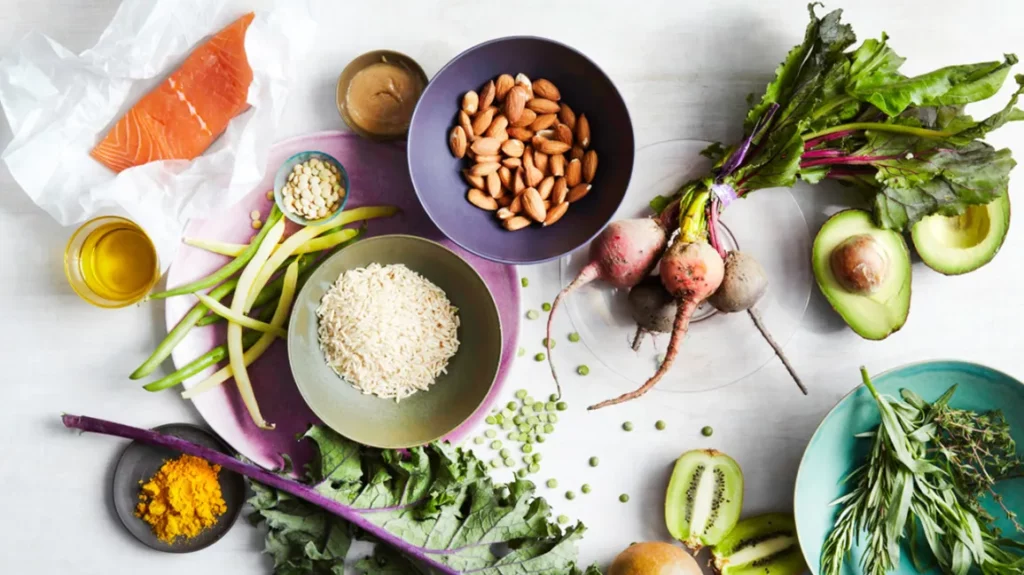Healthy eating goes beyond just munching on salad leaves and eating bland meals; proper nutrition can also help strengthen both the mind and body.
Label-read and select foods that provide essential vitamins and nutrients, while limiting sugar, salt, saturated and trans fats.
Make home cooking a priority, stocking your kitchen with nutritious fresh fruit and vegetables as easy-to-graze options.
1. Eat a Balanced Diet
Healthy, balanced diets can be one of the best ways to prevent disease and live longer, yet many find it difficult to make changes to their eating habits. They might try cutting out food they dislike or substituting animal fats with vegetable-based sources (for instance swapping out fried chicken for grilled salmon).
Smart food choices require striking a balance among your diet’s food groups: vegetables, fruits, dairy, grains and protein foods. Furthermore, sugar and salt consumption must also be limited.
An ideal diet doesn’t need to be costly; in fact, eating healthily may actually be cheaper than fast food or processed food. By planning ahead and shopping regularly for groceries (for instance switching burgers for salads or spreading peanut butter on apple slices), making smart choices and replacing high-fat options with healthier ones (e.g. switching out fast food for salads or spreading peanut butter on apple slices), making smart choices can actually save money! Planning meals and snacks ahead will help prevent you from resorting to eating out or purchasing unhealthy items at the last minute or through impulse buying something unhealthy from vending machines! Planning meals and snacks ahead will help avoid last minute decisions or dining out or purchasing unhealthy items from vending machines or vending machines!
2. Eat a Variety of Foods
Eating from all five major food groups provides your body with essential nutrients, helps decrease disease risk and keeps your diet interesting with its different flavours and textures. Aim to consume five portions of fruits and vegetables every day (fresh, frozen, canned or dried).
Try to include an assortment of colorful foods in your meals, like green spinach, orange carrots, purple cabbage and red radishes. Different colored veggies and fruits contain various essential nutrients which may reduce your risk for heart disease, stroke, diabetes and some cancers.
Foods containing high levels of sugar, salt, or saturated fat can contribute to serious health issues. If making healthy decisions is becoming difficult for you, Air Force resources like Registered Dietitians and Nutrition Technicians are there to offer guidance and assistance. Alternatively, consider joining a healthy eating group with people all seeking similar improvements in their diets.
3. Exercise Regularly
Most people understand the importance of regular exercise; however, fitting it into our busy lives may prove challenging. Regular physical activity can help improve overall wellbeing by managing weight and helping prevent disease.
Nutritious foods you eat can help provide your body with essential energy for exercise. Eating healthily doesn’t have to be hard or unpleasant – in fact, it may introduce you to new and delicious cuisine. Eating well and being active are two crucial steps towards living a longer, healthier life.
For optimal physical activity benefits, experts suggest adults engage in moderate exercise five days a week for 30 minutes, but just starting out can break that down into two or three 15-minute exercise sessions per week. You should work up to reaching about 80% of your target heart rate; if unsure which that should be, consult with your physician; they’ll let you know what works for you. SMART Goal: Eat vanilla yogurt with blueberries every Monday, Wednesday, and Friday before 9 am over the next month.
4. Drink Plenty of Water
Athleticians and other active people require more water to replenish what has been lost through sweat. Temperature and other external factors also impact this need for fluid.
Drinking eight glasses of water daily has long been associated with helping prevent kidney stones, lose weight and lower risk for high blood pressure. A new study by UC San Francisco researchers suggests these benefits have not been supported by available evidence.
Consuming sufficient water can keep your skin looking more youthful by diminishing fine lines and wrinkles. Water also can help you control appetite and avoid fluid retention if taken before or during meals.
Avoid sugary drinks such as soda and juice, caffeinated and alcoholic beverages and excessive caffeination/alcohol consumption. Instead, choose nutritious food sources for fluid intake like fruits and vegetables for maximum hydration benefits. Add slices of cucumber, lemon or lime slices to plain water to add a flavor boost without extra calories! For optimal hydration choose water as your first hydration source but consider other healthy beverages such as low-calorie tea & coffee drinks and 100% fruit juices in addition.
5. Eat a Healthy Snack
When hunger strikes, it’s essential to select nutritious food over junk. Opting for healthy snacks such as those rich in proteins, fiber and low-fat healthy fats will help avoid weight gain while keeping blood sugar stable, thus avoiding fatigue and lack of concentration. Plus, choosing something nutrient rich such as this will provide energy for an active lifestyle!
Healthy snacks don’t need to be complicated: yogurt with fruit and nuts are both great examples of nutritious snack choices to have on hand for when hunger strikes. Keep them handy so you’re always prepared when hunger hits! Keeping a selection of these in the refrigerator or pantry makes choosing nutritious options when hunger hits much easier.
Before choosing a snack, always read its Nutrition Facts label carefully for its calorie, sodium and fat content. Choose lower-cal foods like yogurt, nuts or whole grain crackers. Avoid foods and drinks with added sugar as one of their first ingredients as much as possible – healthy snacks should provide just enough calories to satisfy hunger without leading to weight gain.




